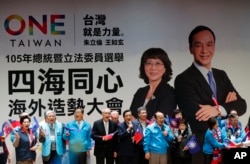Taiwanese voters will pick a new president Saturday after an intense final-hours campaign focused on the island's ailing economy. Voters want higher salaries, cheaper housing and more jobs. Both top candidates say they have solutions.
Taiwan's economy slipped into recession in September and export orders, the island’s lifeblood, have fallen for nine months. Workers complain they cannot afford to buy apartments in Taipei on wages as low as $600 a month or pay to care for children and aging parents. These issues have chased Taiwan’s two major party candidates as they scour the streets for votes ahead of Saturday’s election. Taiwan’s opposition party candidate is leading in polls.
Wang Yeh-lih, political science professor at National Taiwan University, says voters are looking to the next president for a more comfortable living.
He believes the economy is a leading election issue as people demand higher incomes, seek more job opportunities and press other issues related to their personal pocketbooks. Wang adds that common people want to see how a change in party works out because the current Nationalist Party performed poorly over the past eight years.
Taiwan industrialized in the 1960s, but living standards lag those in Japan, South Korea and other places that took the same course. Still, land and labor cost enough to send investors offshore, taking capital out of Taiwan and reducing the number of local jobs.
Current President Ma Ying-jeou disappointed voters by missing targets to raise salaries, lower unemployment and increase the half-trillion-dollar GDP. Since 2008, his Nationalist government has looked for economic support from China. The two countries have signed 23 deals aimed mainly at boosting trade, tourism and investment. China is a powerful Taiwan political rival of seven decades and also the world's second largest economy.
Opposition Democratic Progressive Party candidate Tsai Ing-wen has said she would move to help Taiwan's smaller enterprises get ahead in the domestic market and overseas. In May, her party suggested changing laws to raise wages and shorten work hours from 84 every two weeks to 40 per week. She advocates creating jobs through a network of neighborhood caretakers for children.
The opposition candidate also wants to build 200,000 units of affordable housing to ease worries about high land prices. Apartments in Taipei are priced comparably to other major world cities.
Pre-election opinion polls give Tsai a lead of at least eight percentage points.
The Nationalist candidate, Eric Chu, has pledged to raise the minimum wage in phases from today's $600 per month to just under $900 per month by 2020. Chu suggests opening neighborhood senior care centers to look after elders when their adult children go to work. A party spokesman says he would push for affordable housing in existing units rather than building new ones.
China is another key piece in the puzzle. Candidates traded barbs over which party is best suited to manage relations with the island’s massive neighbor.
"It's important that America and China and other countries around the world want us to keep peace on both sides and maintain regional stability," said Chu. "I promise that I can fulfill that task if I am elected.”
DPP presidential candidate Tsai Ing-wen said "we will maintain the status quo [between China and Taiwan. The two sides will continue to pursue peace and interactive development.”
Taiwan election officials will announce the new president Saturday and the winner will take office in May, when President Ma must step down due to term limits.
Bill Ide in Taipai contributed to this report.






